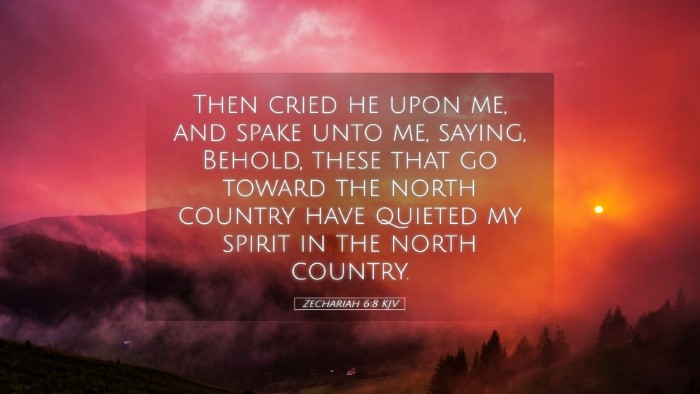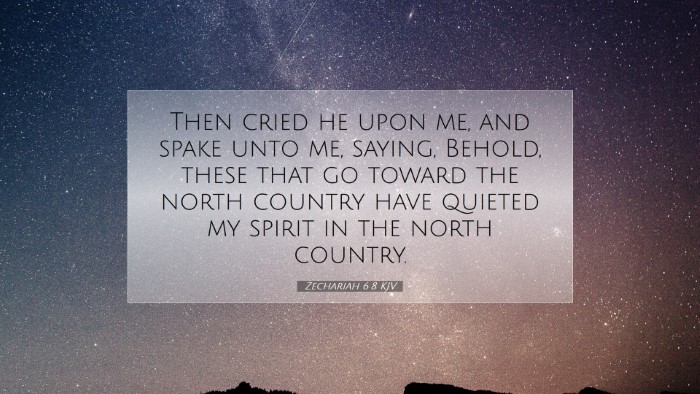Old Testament
Genesis Exodus Leviticus Numbers Deuteronomy Joshua Judges Ruth 1 Samuel 2 Samuel 1 Kings 2 Kings 1 Chronicles 2 Chronicles Ezra Nehemiah Esther Job Psalms Proverbs Ecclesiastes Song of Solomon Isaiah Jeremiah Lamentations Ezekiel Daniel Hosea Joel Amos Obadiah Jonah Micah Nahum Habakkuk Zephaniah Haggai Zechariah MalachiZechariah 6:8
Zechariah 6:8 KJV
Then cried he upon me, and spake unto me, saying, Behold, these that go toward the north country have quieted my spirit in the north country.
Zechariah 6:8 Bible Commentary
Commentary on Zechariah 6:8
Zechariah 6:8 states, “Then cried he upon me, and spake unto me, saying, Behold, these that go toward the north country have quieted my spirit in the north country.” This verse encapsulates important themes of divine guidance and the assurance of God's sovereignty.
Historical Context
The context of Zechariah's prophecies is crucial for understanding this verse. The prophet Zechariah was active during the post-exilic period when the Israelites were returning from Babylonian captivity. The themes in his prophecies often revolved around hope, restoration, and the rebuilding of the temple.
Commentary Insights
Insights from various commentators provide a deeper understanding of Zechariah 6:8.
Albert Barnes' Commentary
Divine Assurance: Barnes notes that the “north country” symbolizes the land from which God’s judgments came, particularly Babylon. The reference to the spirit being “quieted” suggests that God's wrath was appeased, indicating a transition from judgment to restoration. This establishes a powerful message of hope for the Israelites as they navigate their return.
Messengers of God: The “those that go toward the north country” could be understood as angelic beings, fulfilling God’s commands and communicating His will. This ties into the larger theme of divine intervention in the affairs of nations, which is prevalent throughout Scripture.
Matthew Henry's Commentary
God's Judgment and Mercy: According to Henry, this verse illustrates God’s governance of the world, notably through the historical events that affect His people. The quieting of God’s spirit signifies His readiness to bring about a new phase of peace and restoration following a period of turmoil. This interplay between judgment and mercy is an essential narrative for spiritual leaders.
Encouragement for Rebuilding: Henry emphasizes that God's acknowledgment of the events in the north could serve as encouragement for the rebuilding efforts in Jerusalem, suggesting a divine end to the trials faced by the Israelites. This is particularly relevant for pastors focusing on rebuilding communities after strife.
Adam Clarke's Commentary
Symbolism of the Chariots: Clarke delves into the symbolism presented in the preceding chapters, particularly the vision of the four chariots. The chariots represent God’s agents executing His will across the nations. The specific reference to the north indicates a focus on Babylon, wherein God’s messengers were at work.
Spiritual Rest: Clarke also highlights the concept of 'quieting the Spirit' as a metaphor for achieving a sense of spiritual rest, which resonates deeply with believers striving for peace in tumultuous times. This signifies that God brings rest not only to nations but also to the hearts of individuals.
Theological Implications
This verse carries significant theological implications, particularly concerning God’s sovereignty and His continual involvement in the affairs of humanity. The narratives established through here resonate with the themes of God's omnipotence and the assurance that He is active in bringing about His purposes in the world.
Practical Applications
For pastors, students, and theologians, there are several practical applications drawn from Zechariah 6:8:
- Trust in God’s Plan: Believers are encouraged to trust that God's plans will ultimately lead to peace and restoration, no matter how chaotic the present circumstances may seem.
- Role of Divine Messengers: Understanding the role of God’s messengers can inspire spiritual leaders to be conduits of God’s peace and restoration in their communities.
- Spiritual Vigilance: The verse challenges us to remain spiritually vigilant, recognizing that even in silence, God is working out His purposes.
- Hope in Restoration: The assurance that God's spirit has been quieted invites believers to celebrate the hope of restoration, both personally and corporately.
Conclusion
Zechariah 6:8 encapsulates profound truths about God’s nature and His dealings with humanity. The combined insights from public domain commentaries invite us to appreciate the depth of this verse, which not only speaks to the historical context of Zechariah’s time but also resonates with contemporary believers seeking assurance in God's sovereignty. Ultimately, this verse reassures us that God is always at work, turning judgment into mercy and chaos into peace.


